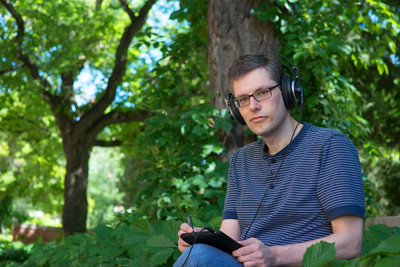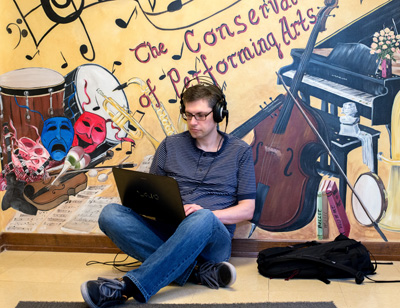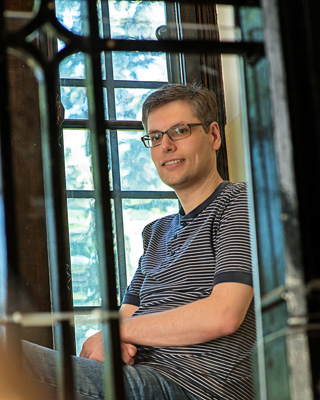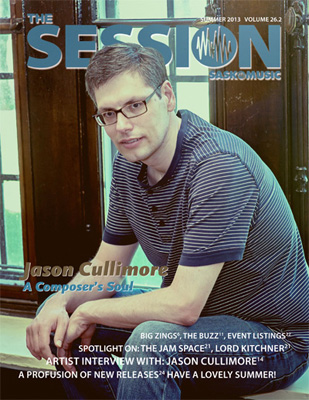As the Saskatchewan music industry continues to grow and excel in every area, we are seeing a lot of local artists being recognized on multiple local, national, and international mediums. With the recent announcement of the 2013 Western Canadian Music Award nominees, Saskatchewan can be proud of 19 nominations in various categories, three of which belong to Jason Cullimore, a local composer with a great amount of recognizable talent.
 “When I read my email and saw that I had been nominated three times I was like, that is incredible!” exclaims Cullimore. “I feel very fortunate that the jury saw that this music is on par with something that’s performed live. I felt that maybe I’ve shown that these samples can be expressive.”
“When I read my email and saw that I had been nominated three times I was like, that is incredible!” exclaims Cullimore. “I feel very fortunate that the jury saw that this music is on par with something that’s performed live. I felt that maybe I’ve shown that these samples can be expressive.”
The Regina native considers himself to be a little on the shy side, but when given the opportunity to share his passion for composing music, his excitement and energy flows very naturally, as it does through his work. After sitting down with Jason at a local Regina restaurant I realized just how special it is to have people like him in the well-rounded Saskatchewan music industry.
As a young child Cullimore’s parents, who he says are nothing but supportive, forced him to learn to play piano and then keyboard, but it didn’t take long for him to determine that performance was simply not for him.
“I hated it at the time because I didn’t like practicing the same thing over and over again,” he says. “But man, am I thankful that they forced me to take those piano lessons because it led directly to me becoming a composer.”
One day in early high school, Jason felt compelled to sit down in front of an old family organ that he hadn’t looked at in years, since giving up on keyboard lessons.
“I remember this really well,” explains Cullimore. “One day I went down and started playing on it, found that I really enjoyed it, and wrote my first semi-composition. It got me hooked.”
After that he sought out a means of recording his compositions, so he turned to his Commodore 64, a system brought home from work by his father, a university professor at the time. “I had one of the first personal computers - I was programming when I was like five or six years old. When you’re born in the ‘70s that’s not very common,” Jason laughs.
He believes that this unusually early computer programming experience is what led him back to that Commodore to start recording.
“There was computer scoring software at the time, (so) I started putting my music into the computer; at that time I knew it was going to be something very important to me because I just got so much out of it.”
After graduating high school, Jason set out to study Biology at Queens University in Kingston ON, despite his recently discovered love of composing.
“While I did that degree I found that I was spending all of my free time composing. When I wasn’t studying, I was composing.”
So after graduating with his degree in Biology, Jason decided he was ready to pursue music. After doing some research, he discovered Music Psychology, the perfect way to combine music and science. So he switched gears, and for his Master’s Degree, studied music psychology and cognition.
“It was really interesting, but by the time I had finished my Masters Degree, I had still been composing in all of my free time. I decided when I graduated that I wanted to be a professional music composer; that was my calling and what was most important to me.”
Upon graduating, Jason returned to his home city of Regina with intentions of sticking around for only a few months, but soon realized the great work potential in the booming film industry.
 “I managed to get work doing scores for television shows, some movies, making contacts, networking and the like. I’ve been doing that for the past 15 years,” Jason notes. “I found that here in Saskatchewan, I’ve had the opportunity to work on so many different projects. It’s a great place to start a career because there are so many people doing so many interesting things.”
“I managed to get work doing scores for television shows, some movies, making contacts, networking and the like. I’ve been doing that for the past 15 years,” Jason notes. “I found that here in Saskatchewan, I’ve had the opportunity to work on so many different projects. It’s a great place to start a career because there are so many people doing so many interesting things.”
Jason developed his home studio, consisting of four computers, Cubase software (which he describes as a “word processor for music, it doesn’t write anything for you but it records your ideas,”) and multiple sample libraries.
“I load sample libraries into the computer, so for example if you want a piano sound you would load a patch that’s a recording of every note on the piano recorded 10 different ways...and the same for any other instrument,” he explains. As a pianist has a piano, and a violinist has a violin, Jason has his computer.
“What I do is very much tied to my computer. I’m not a performer; I can play keyboard passably to work out my themes and melodies, but in terms of my creative outlet, it’s all composition, and I use my computer as an intricate part of my creative process. I’ve always said that my instrument is the computer. That’s what I spend all of my time working to get good on.”
Jason has many credits and awards to prove just how much his hard work and dedication has paid off.
In 2005 he was in charge of the music for “No Limits”, the artist program of the Canada Summer Games. “I recall realizing that I was the authority on music there, and that led to a lot of contacts that have helped me through my career ever since. It was a turning point for me, something that definitely led to bigger things. I was there not because I was learning how to be a composer, but because I was the composer.”
In the past 15 years Jason has done composing work on popular chilren’s programs “Incredible Story Studio” and “2030 CE”, which was nominated for a Gemini for its soundtrack. He has written for multiple chamber ensembles and has had several pieces performed by symphony orchestras, including The Victoria Symphony, The Regina Symphony Orchestra, The Village Orchestra, and RSO Chamber Players.
“Fanfare,” one of Jason’s more recent compositions, was the season-opening piece for the Regina Symphony Orchestra’s 2012-2013 concert series. “Incredible experience and I’m so thankful to the RSO for that. If it wasn’t for their interest in promoting local composers’ music I probably wouldn’t have had that experience, and I wouldn’t have gotten as far as I have.” Film and television productions, theatre and ballet productions, and multiple recording projects have all been a large part of his career thus far.
Currently Jason is working on a piece titled “Gamer Symphony”, a project that was awarded an Arts Board grant.
“It’s inspired by typical scenes and character situations in video games. It’s cinematic orchestral music and I’m hoping it’s something that orchestras will like to play when they want to bring in a younger or less traditional symphony crowd.” He explainsm, “I’ve written a few pieces that are centered around video game themes - not musical themes but the sort of settings and things like that. I find that that’s actually really inspirational for me.”
Cullimore describes the insight provided by certain video games, how exciting it is to fill in the blanks of the stories with his music, finding the graphics far less intriguing than the characters, settings, and story.
“I find the idea of being part of a story, that you actually feel like you have some control over how it transpires and you discover how it unfolds instead of watching how it unfolds, really cool. It’s not just because the music is getting more cinematic and ambitious, it’s also because I find video games a really engaging art form. It’s a new area for me to expand into.”
Some of the key things that Jason, as a composer, has to take into consideration when writing “Gamer Symphony” for orchestra is whether or not the piece is playable, relatable, and inspiring.
“I think when people only write with samples they lose touch with the fact that music is supposed to be an expressive thing, not just for the composer, but for the performer,” he explains. “It’s when the performer really understands what the composer is trying to put across, and feels invested in that music,that it becomes something more than a ‘score’ could ever be. That’s one of the reasons why, when I went applying for this project, I wanted to produce something that was going to be performed by live musicians.”
Jason finds influence and inspiration in variety of fellow artists including John Williams, a composer of some of the most popular and recognizable film scores, and Hans Zimmer, a German film composer who has composed music for over 100 films. Turning to the performance realm, he notes The Beatles having a major influence on him during childhood and still now as an adult, along with Sufjan Stevens, and Daft Punk.
“I think their stuff is incredible,” exclaims Jason in regards to the French electronica artists Daft Punk, making a connection to the various genres and styles in today’s world of composing.
 “What I love about electronica is just the range of sounds and colours that you can get out of synthesizers,” says Jason. “I used to have a recurring dream that I had one of those early synthesizers with like a thousand buttons on it, and each button was a different instrument sound; I realized that a few years ago I’d stopped having that dream...(because) with all the software I have and all the different synthesizers and sample libraries, I have all those sounds. That’s one of the reasons I think it’s exciting to be an electronica producer, the range of sounds you can get and the ways you can sculpt those sounds. I have a lot of respect for really good electronica composers.”
“What I love about electronica is just the range of sounds and colours that you can get out of synthesizers,” says Jason. “I used to have a recurring dream that I had one of those early synthesizers with like a thousand buttons on it, and each button was a different instrument sound; I realized that a few years ago I’d stopped having that dream...(because) with all the software I have and all the different synthesizers and sample libraries, I have all those sounds. That’s one of the reasons I think it’s exciting to be an electronica producer, the range of sounds you can get and the ways you can sculpt those sounds. I have a lot of respect for really good electronica composers.”
Aside from composing, Jason has also developed and taught a third year Music Psychology course at the University of Regina. Combining his extensive knowledge and experience in science and music psychology, Cullimore aims to educate his students with practical and interesting information, taking the psychology and applying it to their everyday lives.
“It’s scary and stressful because I’m a fairly shy person, but I think the more I do it the more I realize that there’s an opportunity to affect and engage people and give them tools to better their own lives.” He continues, “I think teaching is definitely becoming more and more a part of what I do.”
Anyone who is passionate about their craft will tell you that it’s important to keep on top of your industry, and that’s exactly the case for Cullimore. He belongs and sometimes contributes to a lot of online communities, reads various forums, and keeps up on Soundcloud, but claims that it’s not hard to keep up given the convenience of the internet.
“I’m Canadian, and I’m a Saskatchewanian, but I’m also a composer. Composers cross borders - there’s a whole community of us. It doesn’t matter if you’re across town or across the world. That’s a special thing I’ve found.”
Jason Cullimore is a great example of just how far passion, persistence, and hard work will take you. He has multiple awards and achievements, including his three recent WCMA nominations in the Instrumental Album, Classical Recording, and Classical Composition categories.
“If I can listen to a piece of music I’ve written and say that’s as good as I can do it at this point, or it’s pushed me forward a bit, then I feel that’s success. If it has taken me somewhere new as a creator that’s a big success for me. If you take those as successes, that’s what will keep you moving forward.”
He also advises, “The most important thing is to practice. I know it’s kind of cliché, but if you enjoy something so much that you want it to be your career, then you should do it as if it is your career.”
For more information and to listen to some of Jason’s work, visit www.jasoncullimore.com.
Originally published Summer 2013. This article is posted as initially published. For reprint/usage permission or any other questions, please contact SaskMusic.











